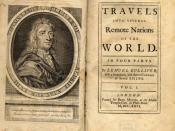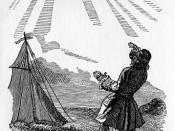Gulliver's travels satireFrom the late seventeenth century to the end of the eighteenth century European thought was dominated by the idea of rationality. No longer did men accept supernatural or religious explanations for the way things were as they had previously. In the Age of Reason everything was to be explained rationally, according to natural causes.
But if reason helped philosophers and scientists to penetrate some of the mysteries of nature, it proved less effective in solving problems within human society. The contradictions between man's rational, intellectual accomplishments and the irrational way he conducted his life led some writers to question the Age of Reason's assumption that man is a rational creature. Satire becomes the dominant form in literature, as writers ridiculed a creature who could discover the laws of thermodynamics but could not organize a sane society.
Authors of the Age of Reason could just write books about the problems that the country was encountering in this Age of Reason, but they found in satire the best way to make critics about all of the imperfections that disturbed a great part of the society.
One of theses authors that deserves highlight because of his well-qualified works is Jonathan Swift.
When Swift wanted to criticize any institution he used to make some severe attacks using his developed cynicism. But it is important to know that, while he never fails to criticize institutions and mankind at large, he never defames an individual. Instead, he focuses directly on the principal religious, political and social issues of the age. Swift's work that effectively shows his satirical view and which probably is his best book is Gulliver's Travels.
Gulliver's Travels is an unrealistic novel which was written in the form of an imaginary trip. The protagonist of the book makes four voyages, each...


